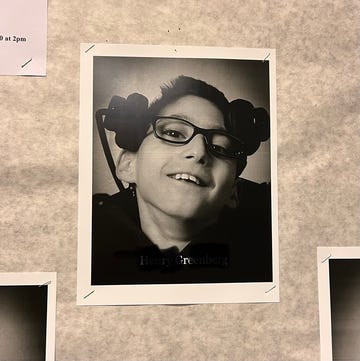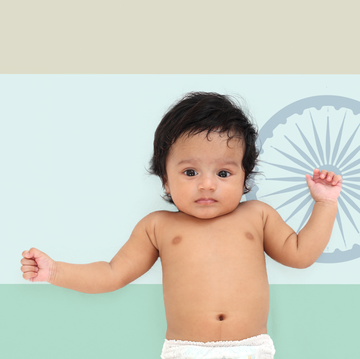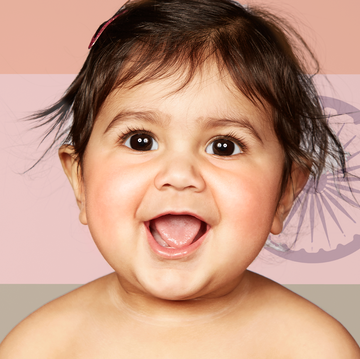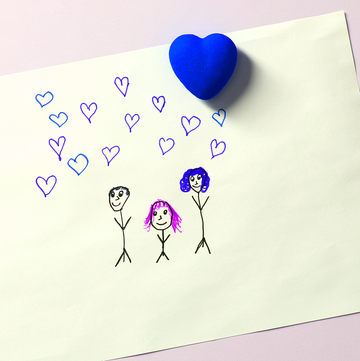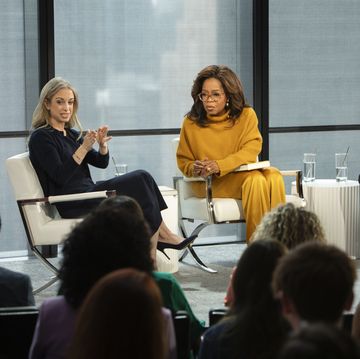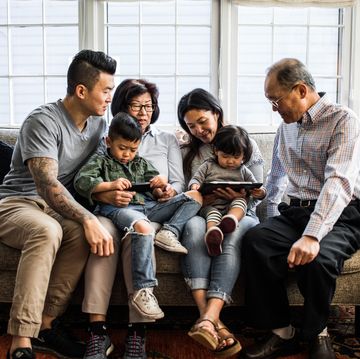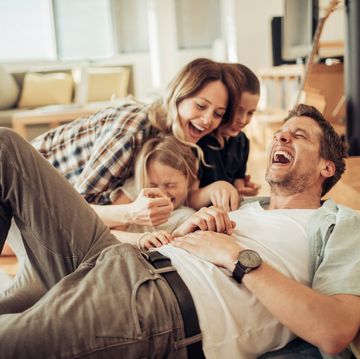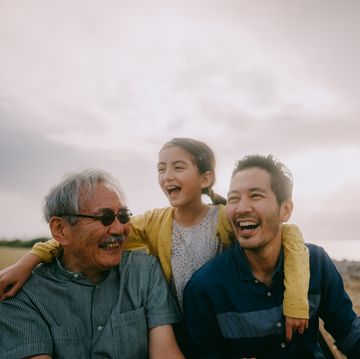My daughter Lucy's friend — let's call her Maleficent — gleefully told her this story: She and some other kids spent an afternoon hurling snowballs at passing cars. One driver was so surprised by the attack that his car jumped the curb and hit a tree. After the accident, instead of checking to make sure the driver was OK, Maleficent (then 10) and her pack ran away. "It was so funny!" she told Lucy.
Now, Maleficent might have been lying. She'd been known to exaggerate to get attention. But I felt horror at the possibility that her story was even a little bit true. Lucy, for her part, didn't quite know how to respond. Was the snowball ambush cool — or criminal? I imagined a scenario in which Maleficent seduced Lucy into joining in. "Come on," she'd say, handing Lucy a snowball. "It's fun!" Shudder.
My initial inclination was to cut off Lucy's contact with Maleficent, as in: "That kid is a future psycho, and you're forbidden to see her again!" I didn't deliver that speech, though. Banning contact seemed bound to backfire (Exhibit A: Romeo and Juliet). In my own childhood, sneaking around with the bad kids had been twice as exciting because Mom hadn't wanted me to. So, what to do? Not saying something seemed irresponsible, but would my interfering make the girls gang up on me?
As parents, obviously we want to steer our kids away from toxic friendships. But sorting out which are the rotten apples, opening our kids' eyes to what concerns us, and phasing out a dangerous friendship is tricky. So what, if anything, can we do to protect our children from the Maleficents of the world? Here, what I've learned:
Define "Bad Friend"
What should raise your hackles? You have to forgive conflicts of taste and focus on genuine red flags, behaviors that display flawed morals and values. Yes, fear the troublemakers. "Kids do take bigger risks when they're together," says Laurence Steinberg, Ph.D., professor of psychology at Temple University in Philadelphia and author of You and Your Adolescent: The Essential Guide for Ages 10 to 25. He and a team of researchers examined teen brain activity while kids played a driving game either with friends in the room or while alone. "When friends were nearby, teens took greater risks, running red lights and crashing," he notes. "Scans proved that the reward center of the brain gets hyper-aroused when peers are present."
Also worry about social climbers; they may be the worst influence of all. "The more kids care about being popular, the more aggressive they are," says Robert Faris, Ph.D., a sociologist at the University of California, Davis, who recently conducted a study of 3,700 eighth, ninth, and 10th graders about popularity, peer pressure, and meanness. "They viewed aggression as a way to maintain social status," he says. By "aggression" he means bullying, either physical or verbal. The behavior is contagious," warns Faris. "A minority of popular kids are aggressive — only about one-third — but the vast majority of aggressive kids want to be popular, and although it's hard to measure, the meanest kids seem to be the most desperate."
How to Phase Out A Problem Friend
So what to do if a bad seed suddenly goes into heavy rotation among your little darling's pals? Fortunately, "most kids under 12 can be brought into line," says Edward Hallowell, M.D., a psychiatrist in Sudbury, MA, and author of several books on parenting. "If a friend comes over and behaves badly, you have to intervene; then have a talk with your child about him. Parents often make the mistake of accommodating a friend's bad conduct for fear of hurting their child socially. But that can be a tacit endorsement." Think about it this way: "Kids count on their parents to have high standards for their friendships; any child under 12 is not old enough to make these decisions solo," says parenting expert Christine Carter, Ph.D., author of Raising Happiness.
But how do you talk so your child will listen? Dr. Hallowell's advice is to keep it simple: "Say, 'That kid is rude. He kicks the coffee table even after I tell him to stop. I don't like that about him. Help me understand: What do you like about him?' After a frank conversation with your child, maybe he won't want to spend as much time with the unruly friend."
When your kid responds to your questions, you'll learn not only about the friend, but also about your own child. Your son might have hooked up with a video game junkie because, as he'll explain (hard swallow), the geek is the only kid at school who talks to him. "When having a conversation with your child, listen as much as you talk," says Carter.
Also, cautions Steinberg, "don't label the kid; label the bad behavior. Give a good reason for not liking [the friend], and your child may well respect it. Kids really do care what you think." You can say, "When Billy comes over, you play a lot of violent video games, so I'd rather you spent less time with him."
Some friendships won't be uprooted with mere talk, however. "Sometimes subterfuge can be a parent's best friend," says Dr. Hallowell. "Plan weekend visits to your relatives to avoid sleepovers. Schedule doctor's appointments during their usual playdate afternoons. Hover whenever the kid comes over." Also, know that the friendship will probably fade. "Most connections don't last long," says Steinberg. "There's a lot of instability in friendship during childhood. If you don't like your kid's friend, one wise strategy is to back off and let the friendship run its course."
What To Do During The Teen Years
"Intervening in adolescents' friendships is much trickier," says Carter. "As soon as kids start to individuate — or separate themselves from parents to form their own identity — at age 12 to 14, you lose control. They won't end a friendship because you tell them to. They'll defend people they know full well aren't good for them. To guide them, you have to be subtle." Some expert-approved strategies:
• Plant a seed For example, if you've noticed that bossy Sally always dictates any activity she and your daughter do together, you can say, "You're going to see Thor? Boy, you really have changed." Your daughter might ask, "How so?" You can reply, "You used to hate superhero movies. But since Sally picked the last three films you went to, I figured this one was your call." OK, maybe that's not so subtle. Sometimes it's all right to break out the Mjölnir (a.k.a. Hammer of the Gods — which you'd know if you'd seen Thor).
"You plant the question in her mind — 'What do you see in Jane? She seems really critical to me,'" suggests Carter. "Don't expect an immediate revelation. More likely it'll take some time to trigger a response."
A month down the road, you might notice that your daughter isn't hanging out with Bossypants Sally or Underminer Jane so much. Do not gloat. "If you glory in the end of the bad friendship, your teen will feel like she's been played and might wind up reversing her decision," Carter says.
• Lay down the law Sometimes you do need to limit, if not forbid, a friendship — specifically, if your child is spending time with someone who will damage his safety, self-esteem, or reputation. Use "the same principles as with a child under age 12," Dr. Hallowell says. "If you think the kid is a bad influence, have the discussion about the potential impact on your child, but expect more push-back with teenagers.
"I have two sons," he continues. "As they got older, they questioned me. Regarding one friend, I said, 'I'm concerned about him.' My son insisted he was a good kid despite his hostile demeanor. I gave the boy a chance, and he did turn out to be OK. But when another kid stole from our house, I said, 'He can't come back unless he returns the item and apologizes directly to me.' That never happened, and his cowardice did the talking for me. My son wanted nothing to do with him anymore."
• Walk the walk "You can also look at your child's friends for a deeper understanding of how she sees her parents," adds Carter. "A mom recently said to me, 'My teen only wants to hang out with drinkers.' I asked her, 'How often do you socialize without alcohol?' She answered, 'Never.'" Even with friendships, the grape doesn't fall far from the vine. "Parents can't forget that they're modeling everything to their kids, including how to have fun and how to choose friends," says Carter. "If all of your friends are super-needy and demanding, your child might be attracted to that type, too."
Should You Call the Friend's Parents?
You witness or hear reliable gossip about one of your kid's friends getting into serious trouble. "If it was your kid and you'd want to know, then you should call the parents," says Michele Borba, Ed.D., parenting expert and author of The Big Book of Parenting Solutions. Regarding substance abuse, bullying, talk of suicide, cutting, an eating disorder, or any other situation in which a child is in harm's way, "do what you must to protect her," says Borba. "You might lose a friendship with the parent. Your child might lose a friend. But the moral obligation takes precedence."
Borba suggests sticking with specific examples and hard evidence. For example, don't say, "I'm no expert, but I think your daughter has some eating issues." Do say, "When Brenda was over this afternoon, I heard her vomiting in the bathroom after eating some ice cream. I thought you should know." Don't offer any more than that; it's now up to the parent to figure out her next steps.
Going back to the story of Maleficent and the snowballs, I always felt some shame and regret about having been too cowardly to call her mother about the incident. Should I find myself in a similar position again, I won't hesitate to reach out.
What eventually happened with that friendship was this: I began planting seeds. If Maleficent was critical, I'd say to my daughter, "I noticed that she was hard on you about some of your other friendships. What's that about?" I started making weekend family plans that ruled out sleepovers. When Maleficent came over, I hovered irritatingly nearby. Eventually, my daughter started to wriggle out of Maleficent's grip.
Once she got a little distance, she gained perspective. "You know, Mom, Maleficent is a real drama queen. She's always starting fights, and then she complains that she's the victim," she said one afternoon. It was a glorious day for me and a breakthrough for my kid. It was also the beginning of the end of that sketchy friendship — and one of my daughter's giant steps toward maturity.



